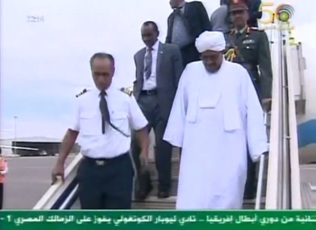Saudi newspaper reveals details of communication between Bashir pilot & control tower
August 6, 2013 (KHARTOUM) – The pilot of the plane that was carrying Sudanese president Omer Hassan al-Bashir over the weekend has acknowledged to the control tower at Jeddah airport that they had not submitted an application for clearance for their flight towards Tehran, a Saudi newspaper reported today.

The Sudanese presidency issued a statement on the same day insisting that the chartered flight piloted by a foreign crew was in possession of the necessary permits and that they informed Saudi authorities that Bashir is on this flight.
But Saudi Arabia’s General Authority of Civil Aviation (GACA) said yesterday that Khartoum did not follow the proper aviation and diplomatic protocol for such flights and claimed that the pilot only informed them about Bashir presence on his way back to Khartoum.
The Saudi-based daily newspaper Okaz said in its Wednesday edition that at 10 am Khartoum local time a “private jet” took off from Khartoum International airport (KRT) and initiated communication 43 minutes later with authorities in King Abdulaziz International Airport (JED) seeking permission to fly through Saudi airspace.
The conversation between the pilot and JED lasted for nine minutes, the newspaper said, during which the air traffic controller asked for the permit number after seeing no record of a scheduled flight for this plane.
The pilot responded by stating that this is a private unscheduled flight headed to Imam Khomeini International Airport (IKA). The controller then asked him if there is a pending authorisation request submitted 48 hours earlier for which the pilot answered by saying that this is an “urgent ad-hoc” trip.
The control tower then declined to allow the plane to proceed prompting the pilot to turn around heading back to Khartoum airport.
At 11:22 am the pilot again contacted JED disclosing that Bashir was one of the passengers on this flight.
Okaz reported that Sudanese presidency queried the pilot afterwards who asserted that he applied for permission before which led them to issue the statement in which they underscored that the plane had clearance.
Voice recordings exchanged between authorities in Khartoum and Riyadh later confirmed that no authorization was applied for and quoted a source who said that the pilot “thought he could easily transit [through Saudi airspace] because the plane is owned by a Saudi [citizen]”.
The Sudanese ambassador to Riyadh Abdel-Hafiz Ibrahim in an interview with the newspaper acknowledged the correctness of the Saudi statement.
When asked why his embassy did not apply for a diplomatic permit for the trip, the envoy said this is only done when presidential planes are involved not chartered ones.
Ibrahim deferred the question on why Bashir did not use the presidential jet to the Sudanese presidency saying he doesn’t know why.
In the past Sudanese officials say they resort to this measure when presidential planes are undergoing maintenance.
The newspaper said that the plane, which is registered in Britain, is owned by a Saudi national who parks it mostly in Cayman Islands which imposes less taxes and fees than other international airports.
The owner has blanket permission to land at any airport in Saudi Arabia on the condition he is present on the flight and that he is not to use the plane for commercial purposes, it added.
Iran’s ISNA news agency quoted Iranian foreign ministry spokesman Abbas Araqchi as saying on Sunday that flight permissions for Bashir’s plane had been obtained in advance but that it was still refused entry and forced to return to Khartoum.
“If it is true that this country has committed such an act, it is deeply regrettable”, he said, adding that Tehran was investigating.
A similar situation occurred in June 2011 when Turkmenistan and Tajikistan refused to grant permission to Bashir’s plane in order to reach China where he was to start a state visit. As a result he was forced to return to Tehran where he was attending a summit there and decide on a new route to reach Beijing.
Observers speculated that Sudan’s growing ties with Iran could have irked the Saudis prompting them to block Bashir’s flight.
Sudan twice allowed Iranian warships to dock in Port Sudan last year, drawing concern by the United States and its allies in the Gulf.
In an editorial last November titled “The fall of masks between Iran and Sudan”, the Saudi pro-government Al-Riyadh newspaper blasted Khartoum over allowing entry to the Iranian warships, saying there is no “logical justification” for a relationship between the two countries.
Bashir has generally seen his travel difficulties mount in the wake of the two warrants issued by the Hague-based International Criminal Court (ICC) in 2009 and 2010 for war crimes, crimes against humanity and genocide over the conflict in Sudan’s Darfur region.
He was forced to cancel many appearances since then for fear of arrest.
Saudi Arabia, however, was one country Bashir frequently visited after his indictment as Riyadh is not party to the ICC statute.
(ST)
